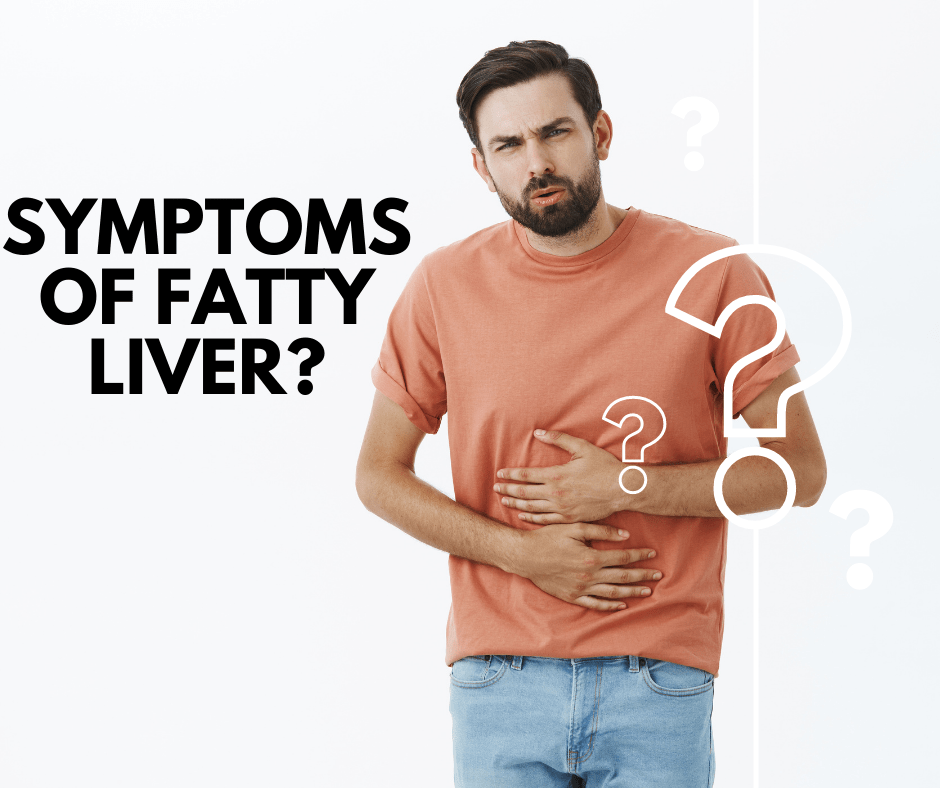
Symptoms of Fatty Liver
Share
Fatty liver, also known as hepatic steatosis, is a condition in which excess fat accumulates in the liver. The liver is responsible for various essential functions in the body, including filtering toxins from the blood, producing bile to aid in digestion, and storing glycogen (a form of glucose) for energy.

In a healthy liver, there is a small amount of fat present. However, when the liver begins to accumulate excess fat in the liver cell, it can become enlarged and inflamed, which can lead to liver damage and scarring
It is often referred to as a "silent" disease because it can progress slowly over time without causing any noticeable symptoms, especially in the early stages. However, as the disease progresses, a person may begin to experience a range of symptoms.
1) Fatigue - One of the most common symptoms of fatty liver disease is fatigue. A person may feel tired or lethargic, even if they have had enough sleep. This may be due to the liver's reduced ability to perform its functions, such as storing and releasing energy.
2) Weakness - Another symptom of fatty liver disease is weakness. This can be a result of the body's reduced ability to absorb nutrients from the food due to liver dysfunction. Additionally, the liver plays a vital role in removing toxins from the body, and when it is unable to do so effectively, it can lead to weakness and other symptoms.
3) Weight loss or loss of appetite - weight loss may occur in people with fatty liver disease. This can be due to the liver's reduced ability to break down and absorb nutrients from the food, leading to a lack of energy and decreased appetite.
4) Abdominal pain - Any discomfort in the upper right side of the abdomen may occur as the liver becomes enlarged due to the accumulation of fat. This pain can range from mild to severe and may be accompanied by bloating or a feeling of fullness.

5) Jaundice - It is a yellowing of the skin and whites of the eyes and occurs when there is an accumulation of bilirubin, a waste product that the liver is unable to process properly.
6) Itchy skin - It may also be a symptom of fatty liver disease. This occurs when the liver is unable to remove toxins from the body, leading to a buildup of bile salts in the skin.
7)Swelling in the legs and ankles- It also known as edema, may occur as the liver is unable to produce enough albumin, a protein that helps regulate the body's fluid balance.
8) Confusion or difficulty concentrating may occur in people with advanced fatty liver disease, especially in cases where liver function is severely impaired.
9) Increased bruising or bleeding tendency- It may also occur due to the liver's reduced ability to produce clotting factors, which can lead to easy bruising and bleeding.

10) Spider angiomas - Spider angiomas are small, spider-like blood vessels that can appear on the skin. These can occur due to the liver's reduced ability to process hormones and waste products, which can lead to changes in the body's hormone levels.

11) Nausea and vomiting - Nausea and vomiting are common symptoms of many liver diseases, including fatty liver disease. These symptoms can occur due to the liver's reduced ability to process toxins and waste products, which can build up in the bloodstream and cause feelings of nausea and vomiting.
Conclusion
fatty liver disease is a common condition that can lead to serious liver damage if left untreated. While many people with fatty liver disease may not experience any symptoms in the early stages of the disease, it's important to be aware of the symptoms that can occur as the condition progresses. If you're experiencing any of the symptoms listed above, it's important to consult a healthcare professional and start the appropriate treatment or proper health care such as changing daily routine life style, food habits , exercises or daily supplements for your liver.
What makes Nutrisage the Best liver detox supplement:
Nutrisage includes all-natural vitamins, minerals, and herbs that support liver health without having any negative side effects or associated health issues. In order for everyone, it should also be inexpensive and simple to use. Niacin, vitamin C, inositol, betaine, choline, and other substances are frequently included in the Best Liver Detox Supplements. These nutrients have been shown to shield our body and liver from the harmful molecules called free radicals that are created when food is metabolized and cause oxidative stress. Moreover, these components aid in liver detoxification, aiding in the removal of other harmful pollutants.

